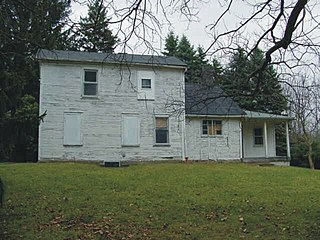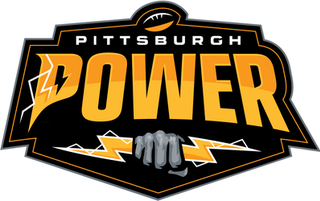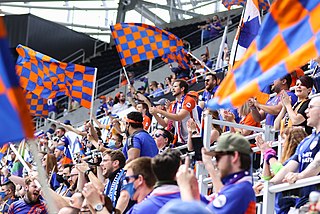
The Philadelphia Soul were a professional arena football team based in Philadelphia, Pennsylvania, and competed in the Arena Football League (AFL). The Soul made five ArenaBowl appearances, winning their first appearance and losing their next two appearances. The Soul won in their fourth appearance, against the Rattlers in 2016, winning 56–42. They also won in their fifth appearance in 2017 against the Tampa Bay Storm, winning 44–40.

The Cleveland Gladiators were an arena football team based in Cleveland, Ohio, United States, and members of the Arena Football League (AFL). The Gladiators played their home games at Quicken Loans Arena, which they shared with the Cleveland Cavaliers of the National Basketball Association and the Cleveland Monsters of the American Hockey League. The franchise was originally based in East Rutherford, New Jersey, and then later in Las Vegas, Nevada, before relocating to Cleveland for the 2008 AFL season. The Gladiators qualified for the playoffs eight times in their history, reaching the ArenaBowl in 2014.

The Cleveland Thunderbolts were an Arena football team based in Richfield, Ohio. The Thunderbolts were founded in 1991 and were a member of the Arena Football League (AFL). In 1994, the franchise relocated to Columbus The team played for four seasons total, making the playoffs once. They played their home games in the Richfield Coliseum. The team was moved to Cleveland by John J. Kuczek.

Rocket Mortgage FieldHouse is a multi-purpose arena in Cleveland, Ohio. The building is the home of the Cleveland Cavaliers of the National Basketball Association (NBA) and the Cleveland Monsters of the American Hockey League (AHL). It also serves as a secondary arena for Cleveland State Vikings men's and women's basketball.
Cleveland Arena was an arena in Cleveland, Ohio. It was built and privately financed by local businessman Albert C. Sutphin during the height of the Great Depression in 1937 as a playing site for Sutphin's AHL team, the Cleveland Barons. The arena was at 3717 Euclid Avenue, and seated over 10,000 in the stands and over 12,500 for events such as boxing, where floor seating was available.

The Gateway Sports and Entertainment Complex is an entertainment complex located in downtown Cleveland, Ohio. It opened in 1994 and is owned by the city of Cleveland and Cuyahoga County and is managed by the Gateway Economic Development Corporation, a non-profit group with board members who are appointed by county and city leaders.

Richfield Township is one of the nine townships of Summit County, Ohio, United States. The 2000 census found 5,424 people in the township, 2,138 of whom lived in the unincorporated portions of the township.

The Cleveland Barons were a professional ice hockey team in the National Hockey League (NHL) from 1976 to 1978. They were a relocation of the California Golden Seals franchise that had played in Oakland since 1967. After just two seasons, the team merged with the Minnesota North Stars. As a result, the NHL operated with 17 teams during the 1978–79 season.
Nick James Mileti is an American author, retired lawyer, former businessman, sports entrepreneur and former sports franchise owner who was, during the 1970s, the owner of the Cleveland Indians, Cleveland Cavaliers, Cleveland Crusaders, the Cleveland Arena, the Coliseum at Richfield and radio station "3WE" WWWE AM/1100.
The 2010 Cleveland Gladiators season was the 11th season for the franchise in the Arena Football League, and the second while in Cleveland. The team was coached by Steve Thonn and played their home games at Quicken Loans Arena. The Gladiators missed out on the playoffs by finishing 5th in the National Conference with a 7–9 record.

The Pittsburgh Power were a professional arena football team based in Pittsburgh, Pennsylvania, United States. The team belonged to the East Division of the American Conference (AC) in the Arena Football League (AFL). Founded in 2011, the Power was the youngest franchise in the AC. The team played its home games at the Consol Energy Center, which they shared with the Pittsburgh Penguins of the National Hockey League. The Power shared the same color scheme as Pittsburgh's other professional sports teams, the Penguins, the Pittsburgh Steelers of the National Football League, and the Pittsburgh Pirates of Major League Baseball.
The 2011 Cleveland Gladiators season was the twelfth season for the franchise in the Arena Football League and the third while in Cleveland. The team was coached by Steve Thonn and played their home games at Quicken Loans Arena. The Gladiators finished the regular season 10–8, and qualified for the playoffs as the 2nd seed in the American Conference. They lost to the Georgia Force in the conference semifinals, 41–50.

The Cleveland sports community is anchored by three major league professional sports teams: the Cleveland Browns, Cleveland Guardians, and Cleveland Cavaliers. The city is also home to two minor league affiliates that serve as developmental teams for a major league franchise: the Cleveland Monsters and Cleveland Charge. Another minor league team, the Cleveland Crunch, play in Major Arena Soccer League 2. Local sporting facilities include Progressive Field, FirstEnergy Stadium, Rocket Mortgage FieldHouse and the Wolstein Center.

Ohio is home to many professional and college sports teams. The metropolitan areas of Cleveland, Cincinnati, and Columbus are home to major league professional sports teams in baseball, basketball, football, hockey, and soccer.

ArenaBowl XXVII was the 27th edition of the championship in the Arena Football League. The National Conference champion Arizona Rattlers defeated the American Conference champion Cleveland Gladiators, 72–32. The game was played on August 23, 2014 at Quicken Loans Arena in Cleveland, Ohio, the home of the Gladiators.
The 2018 Arena Football League season was the 31st season in the history of the Arena Football League (AFL). Prior to the start of the season, the league contracted from five to four teams with one team folding, one going on hiatus, and one added expansion team. The 12-game regular season began on April 13 and ended on July 7.
Outside of the NFL, the city was represented by the Pittsburgh Americans of the second American Football League in 1936 and 1937. It was also briefly represented by the Pittsburgh Maulers of the United States Football League, in 1984, and the Pittsburgh Gladiators, of the Arena Football League from 1987 until 1990. A second Arena Football League team, the Pittsburgh Power, played in the Consol Energy Center from 2011 until 2014.










